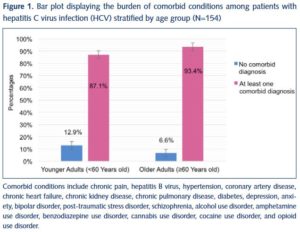 PROVIDENCE, RI — The American Association for the Study of Liver Diseases and the Infectious Diseases Society of America recommend that nearly all patients with chronic hepatitis C virus infection receive treatment with direct-acting antiviral therapy. Still, some clinicians remain leery of treating older patients, given a dearth of randomized clinical trials evaluating current therapies in individuals over age 60 and well-publicized challenges with earlier interferon-based therapies.
PROVIDENCE, RI — The American Association for the Study of Liver Diseases and the Infectious Diseases Society of America recommend that nearly all patients with chronic hepatitis C virus infection receive treatment with direct-acting antiviral therapy. Still, some clinicians remain leery of treating older patients, given a dearth of randomized clinical trials evaluating current therapies in individuals over age 60 and well-publicized challenges with earlier interferon-based therapies.
That’s highly problematic, as complications from HCV infections typically take decades to manifest and individuals in the Baby Boomer generation, now aged 56 to 74, have the highest rates of chronic HCV.
Cautious providers can take comfort from recent study by researchers at the Providence, RI, VAMC, Brown University and Rhode Island Hospital that found that older patients achieved sustained virological response (SVR) or cure with direct-acting antivirals (DAAs) at comparable rates to younger adults.1
“Our findings refute the historical notion that older adults were a ‘difficult-to-treat’ subpopulation for whom clinicians should expect less treatment success,” said the authors. “This is no longer the case with DAA therapy.
The research team conducted a retrospective study of 154 patients with chronic HCV who received DAA therapy between 2015 and 2018 at Rhode Island’s largest health system. More than half the patients were male (53.2%), and most were white (64.6%) and covered by public insurance (82.4%). The average age was 55. Nearly 80% had a current or past history of smoking.
Prior to treatment, 51.9% had a diagnosis of liver cirrhosis, and 12.9% had signs of decompensation. The researchers noted that at the time many of the patients were treated, both public and private insurers in Rhode Island and elsewhere restricted DAA therapy to Stage III or IV fibrosis, a restriction that has been largely lifted in the intervening years.
Four out of 5 completed treatment in less than 24 weeks, primarily with a combination of ledipasvir/sofosbuvir.
Overall, at 12 weeks after the conclusion of treatment, 94.1% of patients achieved SVR. Among those over age 65, the rate was 91.8% and among younger patients, it was 95.6%, though the difference was not statistically significant.
Continue Reading this Article: Comorbidity and Drug-Drug Interactions
